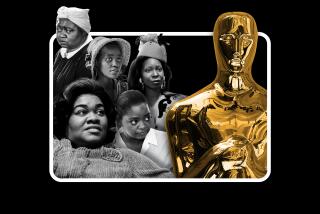Oscar-winner Sam Rockwell on ‘Three Billboards’ and how it resonates with ‘what’s going on in this country’

- Share via
Sam Rockwell sauntered backstage after winning the supporting actor Oscar for his portrayal of an erratic and racist police officer in director Martin McDonagh’s dark fairy tale, “Three Billboards Outside Ebbing, Missouri.”
He looked relaxed, like a man who expected to win after an awards season that found the film he starred in alongside Fraces McDormand and Woody Harrelson garnering a wealth of critical accolades, including seven Academy Award nominations.
Asked what he did to prepare for the volatile role of a deputy who tries to prevent a grieving mother from continuing to publicly chastise the sheriff’s department for not solving the rape and murder of her teenage daughter, Rockwell called his process, “A big soufflé, a stew. I did some ride-alongs with some cops, met with some skin-graft patients. I had two or three months to indulge in all this research.”
He also elaborated on a previous statement that his character’s arc was similar to Barney Fife from “The Andy Griffith Show” transitioning into Travis Bickle from the ultra-violent 1970s parable, “Taxi Driver.”
“The town of Ebbing is very much like Mayberry, and Woody Harrelson is very much like Andy Griffith,” he said. “The goofiness of Barney Fife morphing into Travis Bickle was kind of a generalization. It’s a lot more complicated than that, obviously.”
Rockwell became extra animated when asked why he thanked the late Philip Seymour Hoffman when he accepted his Oscar statuette. He wasn’t sure anyone had heard him because the music was swelling when he uttered his last words.
“He was an old friend of mine, he directed me in a play at the Public Theater,” Rockwell said, adding that Hoffman was an inspiration to all of his peers including Billy Crudup, Liev Schreiber, Mark Ruffalo and more. “Phil Hoffman was the guy, and he was a great director. He vowed to direct a play of a year... I could go on for an hour about Philip Seymour Hoffman.”
Regarding McDonagh’s contention that “Three Billboards” couldn’t be set in Ireland or England, Rockwell said he felt it could be set in almost every working-class town around the world, but, he added, “There is something very timely about it now with what’s going on in this country.”
More to Read
The biggest entertainment stories
Get our big stories about Hollywood, film, television, music, arts, culture and more right in your inbox as soon as they publish.
You may occasionally receive promotional content from the Los Angeles Times.











